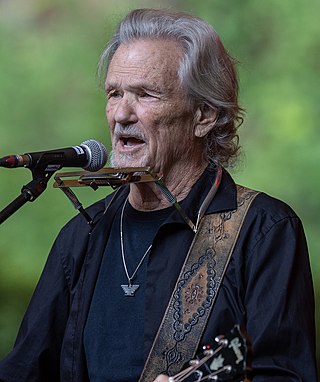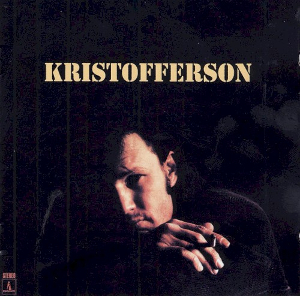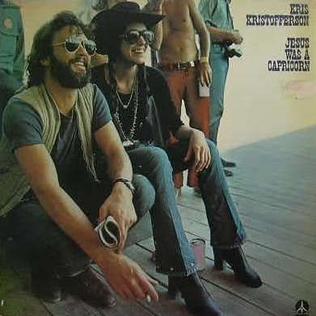Related Research Articles

Kristoffer Kristofferson is an American retired country singer, songwriter, and actor. Among his songwriting credits are "Me and Bobby McGee", "For the Good Times", "Sunday Mornin' Comin' Down", and "Help Me Make It Through the Night", all of which were hits for other artists.

"A Boy Named Sue" is a song written by Shel Silverstein and made famous by Johnny Cash. Cash recorded the song live in concert on February 24, 1969, at California's San Quentin State Prison for his At San Quentin album. Cash also performed the song in December 1969 at Madison Square Garden. The live San Quentin version of the song became Cash's biggest hit on the Billboard Hot 100 chart and his only top ten single there, spending three weeks at No. 2 in 1969, held out of the top spot by "Honky Tonk Women" by The Rolling Stones. The track also topped the Billboard Hot Country Songs and Easy Listening charts that same year and was certified Gold on August 14, 1969, by the RIAA.

"Me and Bobby McGee" is a song written by American singer-songwriter Kris Kristofferson and originally performed by Roger Miller. Fred Foster shares the writing credit, as Kristofferson wrote the song based on a suggestion from Foster. A posthumously released version by Janis Joplin topped the U.S. singles chart in 1971, making the song the second posthumously released No. 1 single in U.S. chart history after "(Sittin' On) The Dock of the Bay" by Otis Redding. Gordon Lightfoot released a version that reached number 1 on the Canadian country charts in 1970. Jerry Lee Lewis released a version that was number 1 on the country charts in December 1971/January 1972 as the "B" side of "Would You Take Another Chance On Me." Billboard ranked Joplin's version as the No. 11 song for 1971.

"Johnny B. Goode" is a song by American musician Chuck Berry, written and sung by Berry in 1958. Released as a single in 1958, it peaked at number two on the Hot R&B Sides chart and number eight on its pre-Hot 100 chart. The song remains a staple of rock music.

"Folsom Prison Blues" is a song by American singer-songwriter Johnny Cash. Written in 1953, it was first recorded and released as a single in 1955, and later included on his debut studio album Johnny Cash with His Hot and Blue Guitar! (1957), as the album's eleventh track. Borrowing liberally from Gordon Jenkins' 1953 song, "Crescent City Blues", the song combines elements from two popular folk styles, the train song and the prison song, both of which Cash continued to use for the rest of his career. It was one of Cash's signature songs. Additionally, this recording was included on the compilation album All Aboard the Blue Train (1962). In June 2014, Rolling Stone ranked it No. 51 on its list of the 100 greatest country songs of all time.

"Ooo Baby Baby" is a song written by Smokey Robinson and Pete Moore. It was a 1965 hit single by The Miracles for the Tamla (Motown) label.

"Lay Lady Lay", sometimes rendered "Lay, Lady, Lay", is a song written by Bob Dylan and originally released in 1969 on his Nashville Skyline album. Like many of the tracks on the album, Dylan sings the song in a low croon, rather than in the high nasal singing style associated with his earlier recordings. The song has become a standard and has been covered by numerous bands and artists over the years.

The Silver Tongued Devil and I is the second studio album recorded by singer-songwriter Kris Kristofferson. It was produced by Fred Foster, released in July 1971 on Monument Records and followed his critically acclaimed debut Kristofferson.

Kristofferson is the debut album of singer-songwriter Kris Kristofferson, which was produced by Fred Foster and released in June 1970 by Monument Records. After working a series of temporary jobs, Kristofferson became a helicopter pilot for oil companies in the Gulf of Mexico. While he worked, he wrote songs and pitched them to singers around Music Row in Nashville, Tennessee during his free time. Kristofferson's songs were recorded by country singers Roy Drusky, Jerry Lee Lewis and Roger Miller and later he persuaded Johnny Cash to try his material. Cash invited Kristofferson to perform with him at the Newport Folk Festival, after which Fred Foster signed Kristofferson to Monument Records as a songwriter and recording artist.

Hello, I'm Johnny Cash is the 33rd album by American country singer Johnny Cash, released on Columbia Records in 1970. "If I Were a Carpenter", a famous duet with Cash's wife, June Carter Cash, earned the couple a Grammy Award for Best Country Performance by a Duo or Group with Vocal in 1971 ; the song also reached #2 on the Country charts. This album also includes "To Beat the Devil", the first Kris Kristofferson song covered by Cash; the two would later collaborate numerous times, most famously on "Sunday Mornin' Comin' Down". "See Ruby Fall" and "Blistered" were also released as singles, and the album itself reached #1 on the country charts and No. 6 on the pop charts. It was certified Gold on January 29, 1970 the RIAA. The album has been released on CD and it has been made available on official download sites. This album is not to be confused with a 1977 Columbia Special Products compilation LP with the same name.

"Help Me Make It Through the Night" is a country ballad written and composed by Kris Kristofferson and released on his 1970 album Kristofferson. It was covered later in 1970 by Sammi Smith, on the album Help Me Make It Through the Night. It has been covered since by many other artists from Tammy Wynette and Johnny Cash to Elvis Presley and Joan Baez.

Jesus Was a Capricorn is the fourth album by Kris Kristofferson, released in 1972 on Monument Records. The album cover pictures Kristofferson and his soon-to-be wife Rita Coolidge. "Why Me" reached #1 on the Country singles charts.

"Why Me" is an American country and gospel song written and recorded by American country music singer and songwriter Kris Kristofferson.
"For the Good Times" is a song written by Kris Kristofferson, first recorded by singer Bill Nash in 1968 before appearing on Kristofferson's own debut album in June 1970. After a recording by Ray Price became a #1 hit single in June of that year, the song established Kristofferson as one of country and popular music's top songwriters while giving Price his first chart-topping country and western song in 11 years.

"Tennessee Flat Top Box" is a song written and recorded by American country music singer Johnny Cash. It was released as a single in late 1961, reaching 11 on the Billboard country singles charts and 84 on the pop charts. The song's name refers to a steel-stringed acoustic guitar.

Help Me Make It Through the Night is the debut studio album released by American country artist Sammi Smith. The album was originally released in September 1970 on Mega Records and was produced by Jim Malloy. The album was originally named He's Everywhere but was renamed Help Me Make It Through the Night due to the popularity of that track, which reached number one on the Billboard country music chart and the Top 10 on the Billboard Hot 100 chart. The album comprised Smith's first recordings for the Mega label.

Have a Little Talk With Myself is the fifth studio album by Ray Stevens and his third and final for Monument Records, released in 1969. Stevens left Monument in early 1970 and signed with Andy Williams' Barnaby Records label. This album is quite different from Stevens's previous albums, for he concentrates on interpreting the works of other writers, and only contributes two of his own compositions. The cover versions include Bob Dylan's "I'll Be Your Baby Tonight", the First Edition's hit "But You Know I Love You", two songs from the musical Hair, three songs of the Beatles, Blood, Sweat & Tears' hit "Spinning Wheel", and Joe South's hit "Games People Play".

The Johnny Cash discography chronicles the output of American singer Johnny Cash. His lengthy career, spanning 1954 to 2003, saw the release of 91 albums and 170 singles on several record labels. Over the years, Cash also collaborated with many of the industry's most notable artists.

The following is a detailed discography of all singles released by American country music singer Waylon Jennings. A total of 16 Jennings' singles have reached number one on music charts.
References
- ↑ "The 500 Greatest Songs of All Time". Rolling Stone. 2021-09-15. Retrieved 2022-07-03.
- ↑ Kris Kristofferson On Writing For — And Outliving — His Idols
- ↑ "The 200 Greatest Country Songs of All Time". Rolling Stone . May 24, 2014.
- ↑ Whitburn, Joel (2004). The Billboard Book Of Top 40 Country Hits: 1944-2006 (second ed.). Record Research. p. 75.
- ↑ Commentary on DVD release The Johnny Cash TV Show 1969-1971, Sony Columbia Legacy, 2007
- ↑ "Wilson Covers "Sunday Morning Coming Down"". CMT . Retrieved 2017-10-04.
- ↑ "Ray Stevens Chart History (Hot Country Songs)". Billboard.
- ↑ "Ray Stevens Chart History (Hot 100)". Billboard.
- ↑ "RPM Top 50 Country Singles - December 13, 1969" (PDF).
- ↑ "RPM Top 100 Singles - November 8, 1969" (PDF).
- ↑ "Johnny Cash Chart History (Hot Country Songs)". Billboard.
- ↑ "Johnny Cash Chart History (Hot 100)". Billboard.
- ↑ Whitburn, Joel (1993). Top Adult Contemporary: 1961–1993. Record Research. p. 44.